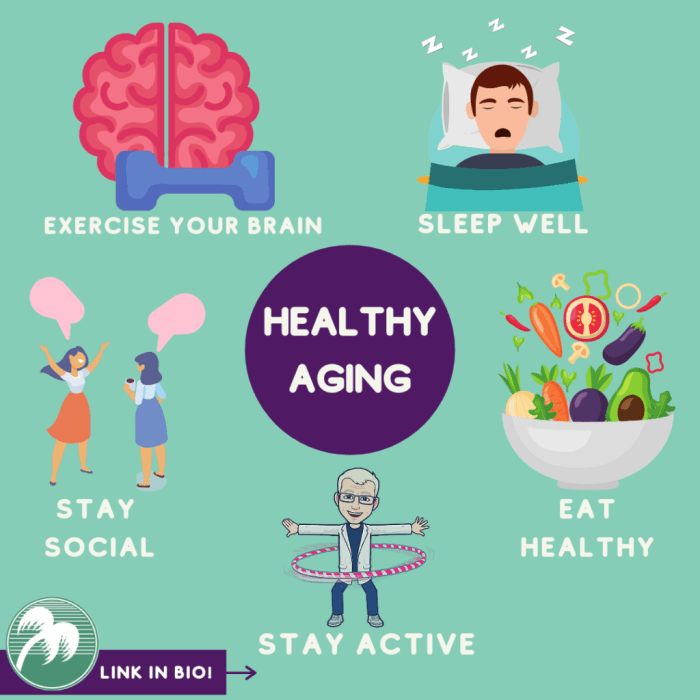Embark on a journey through the world of healthy aging tips backed by science, where knowledge meets practicality. Discover the keys to unlocking a vibrant and fulfilling life as you age gracefully.
Delve into the realm of nutrition, exercise, cognitive health, sleep, and stress management to uncover the secrets to a healthier and happier aging process.
Benefits of Healthy Aging
Maintaining a healthy lifestyle as we age is crucial for our overall well-being and quality of life. By making positive choices and adopting healthy habits, we can significantly reduce the risk of chronic diseases and enjoy a fulfilling and active lifestyle well into our later years.
Improved Physical Health
- Regular exercise can help improve cardiovascular health, muscle strength, and flexibility.
- A balanced diet rich in fruits, vegetables, and whole grains can support a strong immune system and reduce the risk of obesity and related conditions.
- Adequate sleep plays a vital role in maintaining optimal health and cognitive function.
Enhanced Mental Well-being
- Engaging in cognitive activities such as puzzles, reading, or learning new skills can help keep the mind sharp and reduce the risk of cognitive decline.
- Social connections and relationships contribute to mental health and emotional well-being, reducing feelings of loneliness and isolation.
- Managing stress through relaxation techniques like meditation or yoga can improve mental clarity and overall mood.
Reduced Risk of Chronic Diseases
- By maintaining a healthy weight and blood pressure, individuals can lower their risk of developing conditions such as heart disease, diabetes, and stroke.
- Quitting smoking and limiting alcohol consumption can significantly decrease the likelihood of developing lung cancer, liver disease, and other related illnesses.
- Regular health screenings and check-ups can help detect potential health issues early on, leading to timely interventions and better outcomes.
Nutrition for Healthy Aging

Eating a well-balanced diet is crucial for maintaining overall health, especially as we age. Proper nutrition can help support healthy aging by providing essential nutrients to the body.
Examples of Nutrient-Rich Foods
Include a variety of foods rich in essential nutrients such as:
- Fatty fish like salmon, sardines, and mackerel for omega-3 fatty acids
- Leafy greens such as spinach and kale for vitamins and antioxidants
- Berries like blueberries and strawberries for antioxidants and fiber
- Nuts and seeds for healthy fats, protein, and minerals
- Whole grains like quinoa and brown rice for fiber and vitamins
The Role of Antioxidants
Antioxidants are compounds that help protect cells from damage caused by free radicals in the body. They play a crucial role in promoting healthy aging by reducing inflammation and oxidative stress.
Examples of antioxidants include vitamin C, vitamin E, and beta-carotene found in fruits, vegetables, and nuts.
Importance of Hydration
Staying hydrated is essential for healthy aging as water helps maintain bodily functions, regulate body temperature, and support digestion.
It is recommended to drink at least 8-10 glasses of water per day and consume hydrating foods like fruits and vegetables.
Exercise and Physical Activity
Regular exercise plays a crucial role in promoting healthy aging by improving physical strength, flexibility, balance, and overall well-being. It can help older adults maintain independence, reduce the risk of chronic diseases, and enhance cognitive function.
Types of Exercises for Older Adults
- Aerobic Exercises: Activities like walking, swimming, or cycling can improve cardiovascular health and endurance.
- Strength Training: Lifting weights or using resistance bands helps maintain muscle mass and bone density, reducing the risk of falls and fractures.
- Flexibility and Balance Exercises: Yoga, tai chi, or stretching routines can enhance flexibility, balance, and coordination, reducing the risk of injuries.
Cognitive Health and Mental Well-being

Maintaining cognitive function and mental well-being is crucial for healthy aging. As we age, it's important to adopt strategies that promote brain health and emotional well-being to lead a fulfilling life in our later years.
Impact of Social Connections
Social connections play a significant role in the mental well-being of older adults. Engaging in social activities, maintaining relationships with family and friends, and participating in community events can help combat feelings of isolation and loneliness.
Research has shown that strong social connections can reduce the risk of cognitive decline, depression, and anxiety in older adults. Regular interactions with others can stimulate the brain, improve mood, and provide a sense of belonging and support.
Mentally Stimulating Activities
Engaging in mentally stimulating activities is essential for healthy aging. Activities such as puzzles, reading, learning new skills, playing musical instruments, or engaging in creative hobbies can help maintain cognitive function and brain health.
Challenging the brain through mental exercises can strengthen neural connections, improve memory, and enhance cognitive abilities. It's important to keep the mind active and engaged to promote overall cognitive health and mental well-being as we age.
Sleep and Stress Management
Quality sleep and effective stress management play crucial roles in promoting healthy aging. Adequate rest and stress reduction can have a significant impact on overall well-being and longevity. Let's delve into the importance of these factors in more detail.
Significance of Quality Sleep
Quality sleep is essential for the body to repair and rejuvenate itself, especially as we age. During sleep, the body undergoes processes that help strengthen the immune system, improve cognitive function, and regulate hormones. Lack of quality sleep has been linked to various health issues, including cognitive decline, heart disease, and mood disorders.
- Aim for 7-9 hours of uninterrupted sleep each night.
- Create a relaxing bedtime routine to signal to your body that it's time to rest.
- Keep your bedroom dark, cool, and quiet to optimize sleep quality.
- Avoid screens and stimulating activities before bed to promote better sleep.
Tips for Managing Stress Effectively
Chronic stress can have detrimental effects on both physical and mental health, making it essential to manage stress effectively, especially in older age. By incorporating stress-reducing techniques into your daily routine, you can improve your overall well-being and quality of life.
- Practice relaxation techniques such as deep breathing, meditation, or yoga.
- Engage in regular physical activity to reduce stress and boost mood.
- Prioritize self-care activities that bring you joy and relaxation.
- Seek support from loved ones, friends, or a mental health professional when needed.
Relationship Between Sleep, Stress, and Healthy Aging
The relationship between sleep, stress, and healthy aging is intricate and interconnected. Quality sleep can help regulate stress levels and improve the body's ability to cope with daily challenges, ultimately contributing to better overall health and longevity. Conversely, chronic stress and poor sleep can accelerate the aging process and increase the risk of age-related diseases.
Closure
In conclusion, embracing these evidence-based healthy aging tips can pave the way for a more vibrant and fulfilling life as you grow older. By prioritizing your well-being and incorporating these practices into your daily routine, you can truly age with grace and vitality.
Frequently Asked Questions
How can healthy aging improve quality of life?
Healthy aging can enhance quality of life by reducing the risk of chronic diseases, maintaining cognitive function, and promoting overall well-being.
What role do antioxidants play in promoting healthy aging?
Antioxidants help combat oxidative stress and inflammation, two key factors in the aging process, thus promoting healthier aging.
What are some examples of nutrient-rich foods that support healthy aging?
Examples include fruits, vegetables, whole grains, lean proteins, and healthy fats like nuts and seeds.









